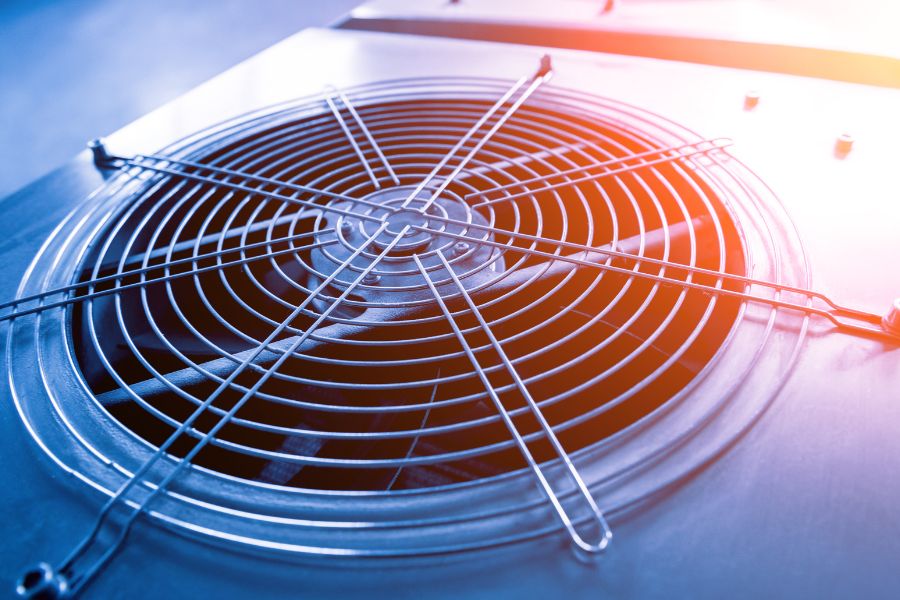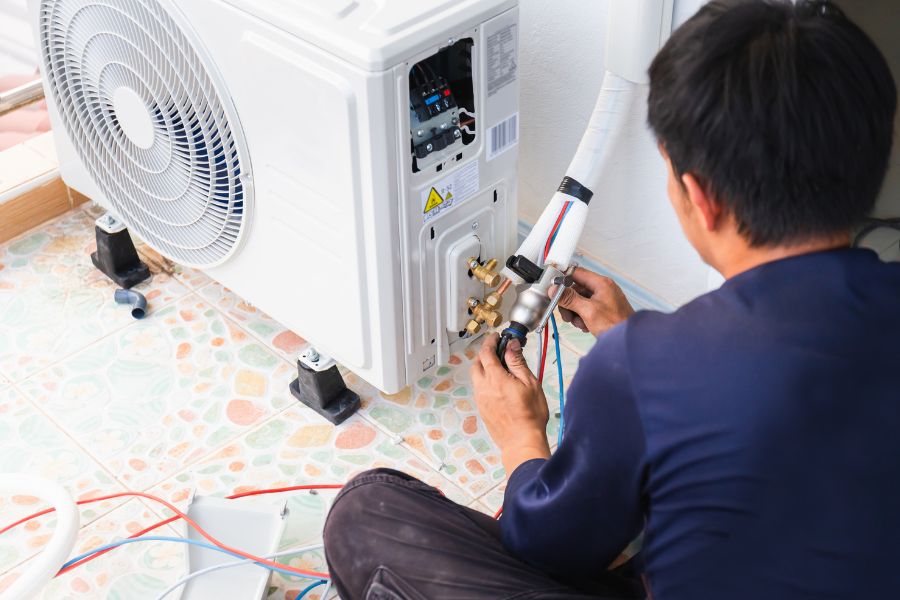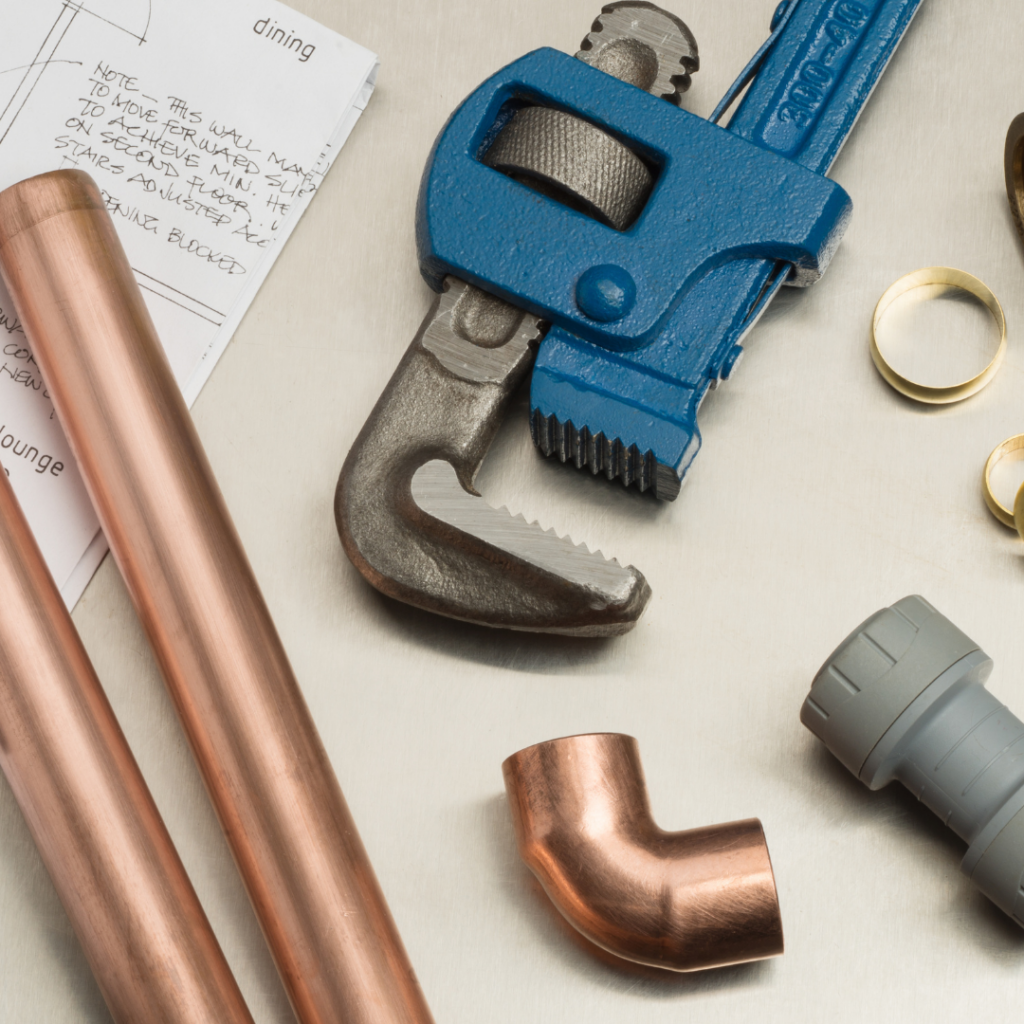Regular maintenance for your AC unit includes checking your AC drain for clogs or backups. A clogged air conditioner drain can lead to water damage, reduced cooling capacity, and mold growth. Nothing is worse in the hot, humid months than an AC unit that can’t run efficiently and racks up higher energy bills.
To avoid damage or increased costs from a clogged AC drain, our plumbing experts in Maryland cover the easiest 8 ways to keep an AC drain from clogging. These are simple, easy to do, and with regular maintenance can be completed quickly. No more clogs, no more damages, and better home comfort.

No matter how good your unit is, wear and tear happens. Dust and debris get trapped over time with usage, clogging AC drains and leading to issues that can cause severe damages and costly repairs if not anticipated.
You want to watch out for excess moisture, things that can block the drainage of the AC line, and more. Sometimes the damage is from dust buildup and sometimes it can be due to neglect over time. With regular maintenance, you are much more likely to reduce blockages that occur from general use.
Our expert plumbers have put together the top ways to prevent an AC drain from clogging. With decades of experience under our belt and a 5-star rating from clients, we feel confident that these AC drain tips and tricks will help you protect your home and reduce AC drain cleanings that may arise unexpectedly or at unfortunate times.
Remember, stick to a regular maintenance plan that occurs seasonally and you’ll be ahead of the game when it comes to AC maintenance and line clearance.
You will want to regularly clean your AC drain to prevent heavy dirt and debris buildup. For regular, non-emergent cleaning without clogs, you can use a mild detergent and water to help reduce buildup. Check the evaporator coil as well to ensure debris and dust are not building up in this area that can contribute to clogs over time with use.
Wet/dry vacuums also help with small obstructions you may find in the drain line. Keep in mind that heavier AC drain cleaning will be required from professional plumbers once a clog or backup has formed.
Look for buildups, heavy dirt, or even algae growth during your monthly drain line inspection. Algae thrive in moist conditions and can be a leading cause of backups in most AC drains, especially in humid climates or areas that receive a lot of storms.
Check your drain pan and line for leaks – leaks that are visible can indicate a blockage. If nothing else, this damage you will want to repair and find the source of before it worsens. You can pour water into your drain’s access point to see if there is proper drainage or if you have blockages or leaks that need addressed.
Monitor the drain line drip weekly – this indicates a clog-free drain. If no drip is present, something is stopping your moisture from exiting.

Overhanging branches or vegetation can introduce debris into your AC unit. Trim back branches and other natural plants weekly or more frequently as needed. This will prevent blockages from occurring. You also want to check for insects and rodents. They will build nests in AC drain lines. The moment you notice these nests, it is important to dislodge the blockage or call for professional AC drain cleaning if the backup is already starting to form and cause damage.
Regular at-home maintenance of your AC drain line should include drain treatments, general cleaning, and air filter changes. Your regular maintenance will assist with the prevention of not only blockages from debris but algae growth as well.
Drain pan treatments can be completed with tablets to help hinder the growth of algae and other microbes. Vinegar or hydrogen peroxide can also be used as a DIY cleaning solution to remove algae buildup in the drain line.
Never forget to change out your air filters. Dirty air filters lead to reduced airflow and increased condensation. With regular changing of your air filters as your AC usage increases, you will have a better chance of preventing clogs in your AC drain.
If you spot a small buildup happening, you can attempt to remove it yourself during regular AC drain line maintenance. A drain line brush can help remove stubborn clogs – gently snake it through the line to dislodge obstructions. Doing so on a weekly or bi-monthly basis can assist in stopping worsening buildup.
When having your AC unit installed, consider putting it on a slight slope to help with water flow. This moves the water away from the unit and the incline can assist in reducing clogs due to the natural pull from gravity.
You will also want to ensure that all drain line connections are tight and secure to prevent leaks and clogs. This is important during your initial install and then subsequently during each maintenance check each season for the best protection.

Everyone’s climate can affect their AC drain line differently. More humid climates may want to consider insulation as part of their regular maintenance, to protect from worsening outside elements. Other homeowners may need to consider condensate pumps if your pump is an area that doesn’t condensate naturally.
If you have higher humidity, adjust your AC settings accordingly to compensate for this build-up. Doing preventive settings directly from your AC unit can help immensely in your AC drain line maintenance each year.
The only way to truly stay ahead of drain line clogs is to know what to look for. Water pooling is always a bad sign, around the drain line or the AC unit. Listen for abnormal sounds when the unit is running and do an inspection if something sounds off in any way.
Don’t forget that no drain line drip indicates an issue, like a blockage that has already formed. If anything else seems off or unusual, call for a professional to assist right away. This could even be something as simple as worsening energy bills or decreased unit efficiency.
Include regularly scheduled professional maintenance from your local plumbing company to check your AC’s drain system before and after each season. This can be scheduled alongside other maintenance in your home to ensure a well-rounded plan for the upcoming season.
There is no substitute for professional plumbers who have the expertise to quickly and efficiently check your drain lines from your AC. This can greatly reduce the time spent fixing or repairing your AC line.

Preventing air conditioner drain clogs is essential for maintaining the efficiency and longevity of your AC unit and the comfort of your home. By following our expert tips and staying proactive with your AC maintenance, you can enjoy cool, worry-free comfort throughout the year.
If you’re unsure about any aspect of AC drain maintenance, it’s best to consult a professional. National Water Service is here for all homeowners who are worried about their drain lines this season. Call today to set up a free estimate.
Cleaning the drain pan every 3-6 months is typically sufficient, but check for visible debris regularly and adjust your cleaning schedule as needed.
While bleach can be effective, it’s best to use vinegar or hydrogen peroxide, as they are safer for the environment. Bleach can cause more problems by being released into the environment or damaging certain parts of the line if used in excess.
Neglecting maintenance can lead to clogs, water damage, mold growth, and reduced cooling efficiency. You may see increased energy bills, declined home cooling, and even incur costly repairs if issues are left unattended.
Professional maintenance annually is recommended for optimal performance and to catch potential issues early. National Water Service recommends scheduling your maintenance before each Spring to stay ahead of problems that may have formed over the Fall and Winter.
In challenging situations, consider hiring a professional to clean and maintain the drain line. Attempting to reach your drain line that is out of reach could have worsening effects and still require a professional inspection.
Yes, you can add a mixture of water and white vinegar to your pan to inhibit algae growth. Some algae growth preventive tablets are also effective and don’t require an at-home mixture – simply add and let it do its work naturally.
National Water Service has been providing residential & small commercial water treatment, plumbing & well pump services for over 45 years. We specialize in water treatment, filtration & purification solutions as well as general plumbing to ensure clean, safe water for our customers in Maryland, DC & Northern Virginia.
Mon - Thurs
7:00am - 5:00pm
Friday
7:00am - 4:00pm
Sat - Sun
Emergency Service Available
National Water Servicing Corporation — 2025 All Right Reserved ™